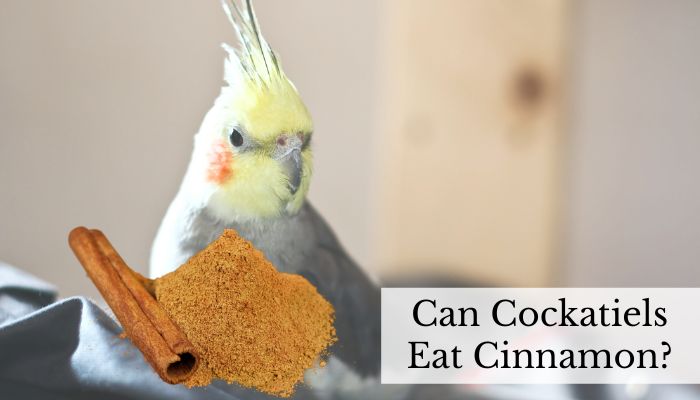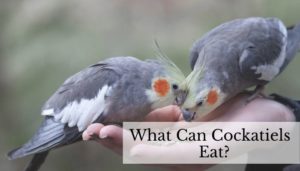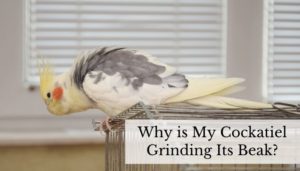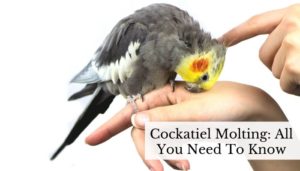Ah, cinnamon. Who doesn’t like cinnamon? Both sweet and spicy, it’s a great addition to many food staples, including desserts, breakfast goods, and even the lattes we down to keep us going through the day.
That said, can cockatiels eat cinnamon? The answer is yes. But while Ceylon cinnamon is highly beneficial for your pet bird, avoid Chinese/Cassia cinnamon, as it can be toxic and cause complications for your cockatiel.
If you wish to learn more about cinnamons in a cockatiel’s diet, keep reading. This article will go over everything you need to know.
Can Cockatiels Eat Cinnamon?
Cockatiels make for wonderful pet birds, thanks to their playful and affectionate personality. But part of taking care of one includes providing for its needs and giving it a healthy diet.
In that case, you’ll be pleased to know that cinnamon makes for a healthy addition to your pet cockatiel’s diet.
Harvested from the inner bark of Cinnamomum trees, cinnamon is a spice that has been used since 2000 BC and is even used to treat conditions like sore throat, coughing and arthritis.
And as long as you are careful about the type of cinnamon you feed to your pet cockatiel, it also makes for a highly beneficial food staple.
Read more: List of What Cockatiels Can Eat
What kind of cinnamon is safe for cockatiels?
That would be the Ceylon cinnamon, which is also the same type of cinnamon found in markets and just about every grocery store.
High in nutritional benefits, Ceylon cinnamon is also known as true or organic cinnamon and comes from a tree native to Sri Lanka.
But while Ceylon cinnamon is perfectly safe for cockatiels, know that Cassia/Chinese cinnamon isn’t. This is because Cassia cinnamon contains high levels of coumarin, a toxic blood thinner that can cause deadly liver complications in parrots.
Keep this in mind whenever you shop for cinnamon for your cockatiel.
What Are the Benefits of Cinnamon for Cockatiels?
Now that we know what kind of cinnamon is safe for cockatiels, what good does your pet get from it exactly?
For starters, Ceylon cinnamon is high in calcium, fiber, manganese, and iron, all of which play a vital role in keeping your pet bird healthy and kicking.
Here are the other benefits of cinnamon:
Improves blood sugar levels – For us humans, cinnamon is often used to improve blood sugar levels and lower the chances of developing diabetes. Well, the same benefit extends to our feathered friends, making it a great diet addition to older cockatiels.
Helps in treating chronic wounds – Cinnamon also plays a vital role in treating any chronic wounds, thanks to the several antimicrobial compounds that help kill bacteria and promote faster healing. This means that if your cockatiel has any infections, cinnamon can help.
Helps in treating fungal infections – According to studies, cinnamon is also helpful in treating fungal infections that can affect the bloodstream, something cockatiels can suffer from.
Helps prevent cancer – Cinnamon contains well-known anti-cancer and anti-tumor properties that will help keep your cockatiel strong and kicking throughout its life.
Aside from these health benefits, the calcium found in cinnamon is also essential for the bone development of cockatiels. At the same time, the fiber helps promote healthy metabolism and prevents digestive issues.
Besides that, cinnamon is also known to help cockatiels that have only been feeding on seeds transition into a healthier and more diverse diet.
Read more: Cockatiel Molting – All You Need To Know
How to Add Ceylon Cinnamon to Your Cockatiel’s Diet?
Given that cockatiels love cinnamon (and spices in general), it can be very easy to incorporate it into their diet, and there are plenty of ways to do so.
The first, of course, is just sprinkling cinnamon over what you’re already feeding your pet. This spices up the food, all while introducing diversity and adding nutrition.
Slightly dampening the food should also make the cinnamon stick better.
On top of that, you can also add cinnamon to bread or some other type of soft bird food.
However, if you want to maximize the health benefits of cinnamon, what you can do is add powdered cinnamon to lentils, barley, or cooked rice while they’re still hot. This draws out the healthy fats, making them easier to absorb for your pet bird’s benefit.
As for the amount of cinnamon you can feed to your bird, it all depends on what type of food you mix it with. Remember that it’s a spice, so it’s very lightweight.
Of course, moderation is still important, and as much as possible, try to add cinnamon into a wide variety of healthy foods to give your cockatiel a more varied diet.
As a general rule, however, stick to feeding your cockatiel with cinnamon-mixed food about two to three times per week.
Aside from feeding, you can also give whole sticks of organic Ceylon cinnamon to your cockatiel to play with. Usually, these sticks come at the perfect size for your pet bird to manipulate and move around.
Not only are they sure to enjoy playing, but the smell should keep them engaged for hours on end. Best of all, it will surely add a pleasant aroma to your home, so both you and your pet benefit from it.
Read more: Why is My Cockatiel Grinding Its Beak?
Related Questions
What kind of cinnamon is safe for cockatiels? The best and safest cinnamon you should give your cockatiel is Ceylon cinnamon. Luckily, this is the same kind of cinnamon usually available in groceries.
What kind of cinnamon should you avoid feeding your cockatiel? Cassia cinnamon is unsafe and toxic for cockatiels and birds in general. This is because it contains a substance that can lead to deadly liver complications in your pet.
Are there other spices that cockatiels can enjoy? Cockatiels enjoy many types of spices including turmeric, cumin, chili powder, and even cayenne pepper, all of which add nutritional value to your pet bird’s diet.
Conclusion
All in all, cinnamon is a safe bet for any cockatiel, and they are sure to enjoy both its great taste and the nutritional value it brings to the table.
That said, do your research before feeding your pet bird something new. This includes knowing the difference between Ceylon and Cassia cinnamon and other types of food as well.




